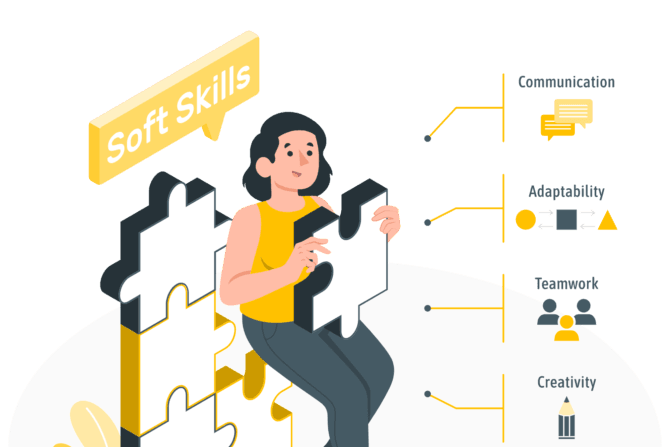Published November 3, 2024
Estimated read time: 3 min
The 3 soft skills most sought after by recruiters

The Soft Skills Revolution
The evolving landscape of work, driven by remote and hybrid models, has elevated the significance of soft skills in the hiring arena. Companies now view these behavioral attributes as essential indicators of a candidate's potential. But in this fast-changing world, what are the key soft skills in demand in 2023, and how do they reshape the recruitment process? These questions are dissected through insights provided by Performanse, offering a comprehensive exploration of the soft skills landscape.
Soft Skills: The New Hiring Imperative
Soft skills have become a cornerstone of modern recruitment strategies. Amidst the challenges posed by global disruptions, understanding the pivotal role of these skills is critical. Companies need adept individuals capable of navigating the complexities of the contemporary workplace, making soft skills an indispensable criterion for hiring decisions.
Challenges in Modern Recruitment: Navigating the Complexities
Recent years have introduced unprecedented challenges in the recruitment domain. From mass resignations to the subtleties of "quiet quitting," organizations grapple with a talent shortage crisis. Pôle Emploi's study unveiled that 58% of recruitments in 2022 proved challenging, marking a 13% surge from the previous year. Additionally, talent retention issues exacerbate HR pressures. Notably, one in three permanent contracts is terminated within a year, emphasizing the financial repercussions of recruitment mishaps.
The Financial Toll: A Costly Misstep
The stakes are high in modern recruitment. A failed recruitment endeavor translates to a considerable financial setback. With the average cost of a failed recruitment standing at €45,000, companies must tread cautiously, emphasizing the importance of precise soft skills evaluation.
Essential Soft Skills: Navigating the Hiring Maze
1. Adaptability: The Cornerstone of Modern Work
Adaptability emerges as the paramount soft skill, enabling seamless transitions in the dynamic workplace. The rapid shift to remote work necessitated swift adjustments, highlighting the need for employees who can acclimate to diverse work scenarios. Recruiters prize candidates capable of embracing change, ensuring the organization's fluidity in the face of evolving roles and technologies.
2. Teamwork Skills: Fostering Collaboration and Innovation
Collaborative prowess, encompassing team collaboration, active listening, and empathy, is indispensable. Teamwork not only encourages idea exchange but also facilitates skill enhancement through mutual learning. Recruiters place teamwork as the second most coveted soft skill in France. Candidates, too, recognize its value, with 91% acknowledging its significance in job selection, as revealed by Microsoft's study.
3. Organizational Skills: The Pillar of Productivity
Organizational skills secure the third position among recruiters' preferred soft skills. An organized employee excels in meeting deadlines, prioritizing tasks, and managing time effectively. A well-organized workforce reduces stress, enhances productivity, and fosters a harmonious work environment.
Strategic Hiring: Nurturing Soft Skills in the Recruitment Process
In 2023, recruiters face the challenge of identifying these critical soft skills during interviews. The creation of a comprehensive list of behavioral competencies and the incorporation of situational interviews prove effective. These strategies empower recruiters to assess candidates holistically, ensuring that adaptability, collaborative spirit, and organizational finesse are meticulously evaluated.
Conclusion: The Soft Skills Mandate
In the contemporary job market, soft skills serve as the linchpin determining a candidate's success. As recruiters delve into the intricate world of behavioral competencies, their strategic approach becomes paramount. Embracing adaptability, fostering collaborative synergies, and nurturing organizational acumen are the keystones to thriving in the competitive realm of modern employment. With the right soft skills, candidates become not just employees but invaluable assets, propelling companies toward unparalleled success.